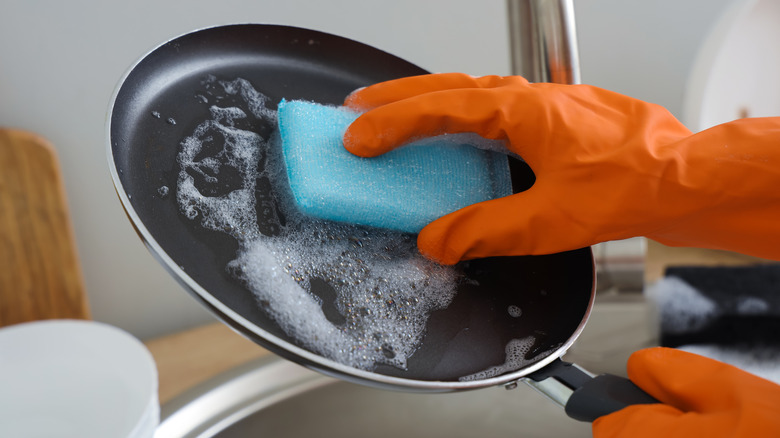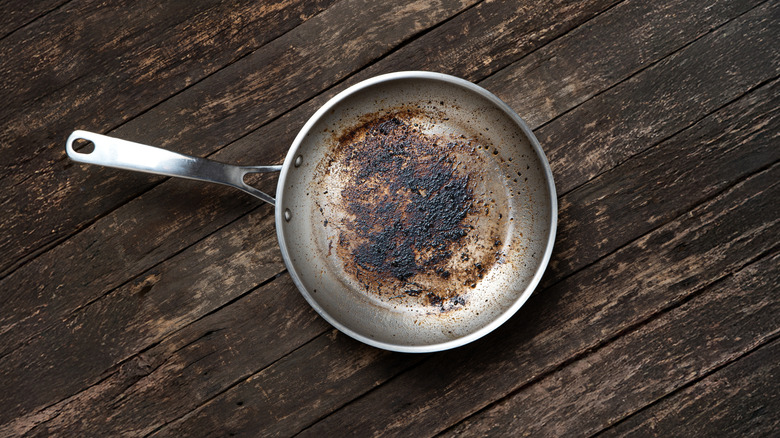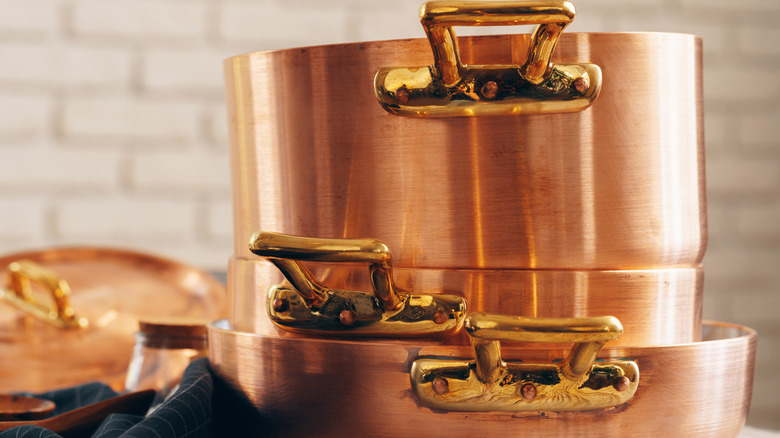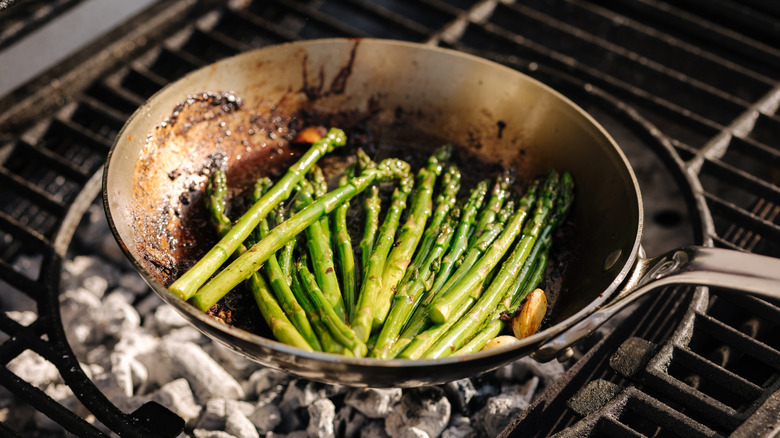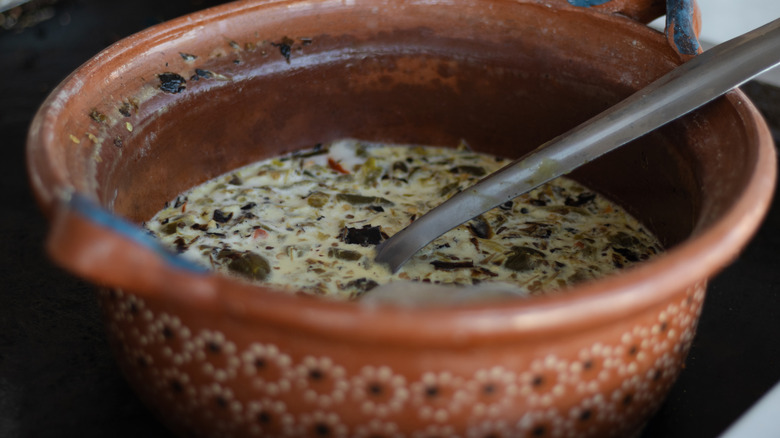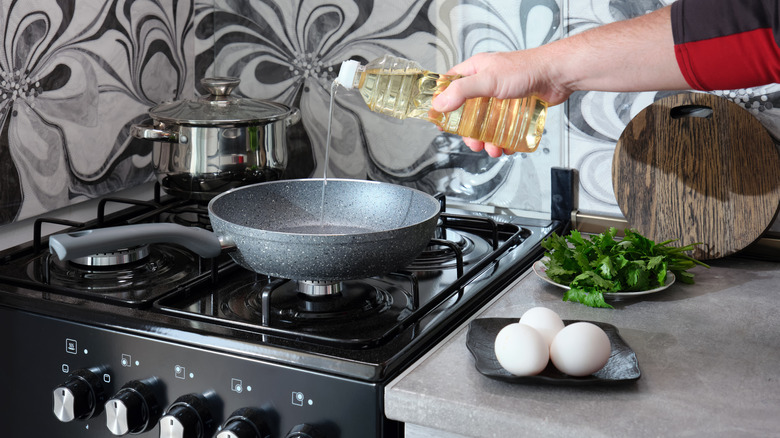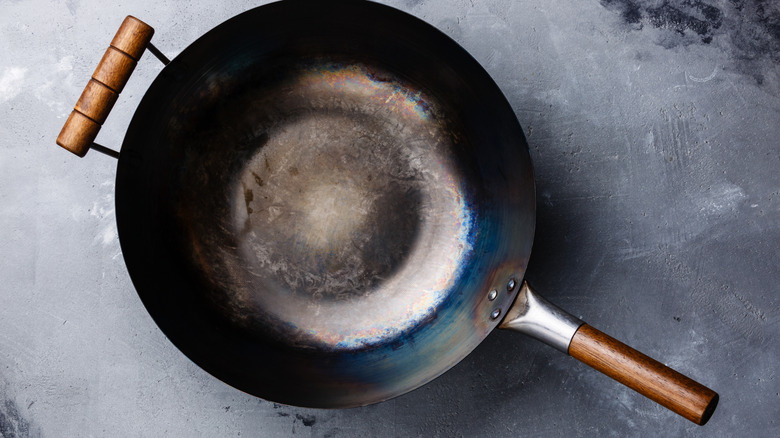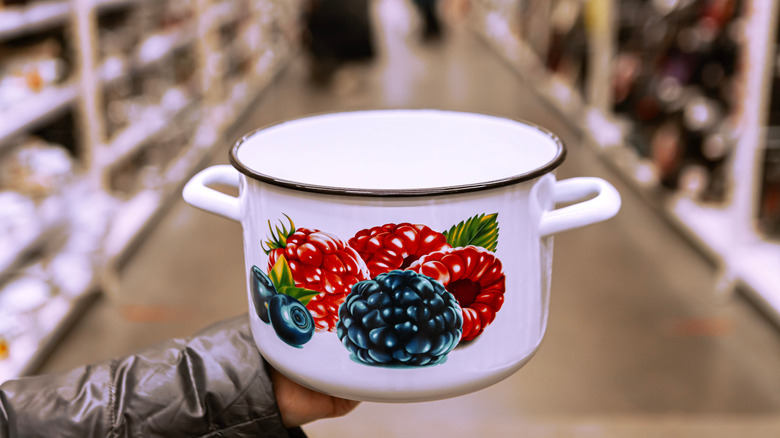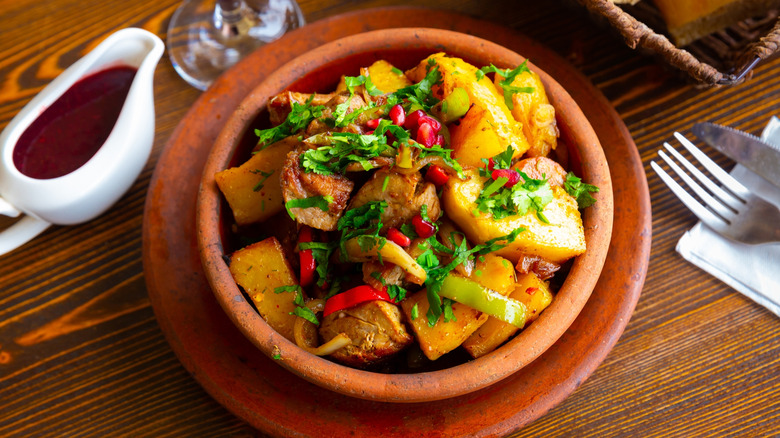9 Types Of Pans That Should Always Be Hand-Washed & Never Go In The Dishwasher
A stunning and functional cookware set can make preparing a meal at home feel less like a chore and more like a luxury experience. From sleek and industrial stainless-steel pans to cozy, ceramic Dutch ovens, your options are endless. However, not all cookware is created equal, and some sets can get quite pricey, so it's imperative that you do your research to ensure you find the perfect match for your household before dropping your hard-earned money on a brand-new set.
There are some popular types of cookware you should avoid using, especially if you lead a busy life and don't have time for the maintenance needed to keep your pots and pans in good condition. If you run your life on a tight schedule, it's wise to opt for a material of cookware that is dishwasher safe to make cleanup after mealtimes brief and easy. However, not all types of cookware are suitable for dishwashers and require handwashing, as any other method could damage both the pans and your appliances over time. These include cast-iron pans, copper pans, or pans with wooden handles.
If handwashing your cookware is a chore you're not keen to add to your to-do list, there are certain types of pans you should avoid purchasing for your kitchen. Luckily, there are plenty of alternative materials to consider, like stainless steel, which most of the time is deemed dishwasher safe; however, if you're unsure, you can always check the label. Here are nine types of pans that should always be handwashed, since loading them in a rack alongside other dirty dishes could make them unusable.
Cast iron pans will be stripped of their seasoning
Cast iron is one material that you never want to put in your dishwasher, since it can sustain permanent damage. The outer layer of seasoning that builds up on cast-iron pans is what makes them so convenient and reliable to cook with, and when you strip that seasoning, you leave your cast iron vulnerable to water or rust damage. Instead, the best way to clean this type of pan is to wipe it thoroughly with dry paper towels, then heat it on the stovetop to kill any germs.
Aluminum pans can become corroded or tarnished
Aluminum cookware is another one of the common kitchen items you shouldn't put in the dishwasher, especially if your pans are uncoated. Aluminum can react with the heat and chemicals found in dish detergent, which can turn your sparkling chrome pans into murky, stained, and tarnished ones. When you run aluminum pans through your dishwasher, you risk them becoming corroded or discolored. Instead, use a mild dish soap and warm, running water to gently hand-wash your aluminum pans, and avoid using abrasive materials like steel wool, which can scratch and damage aluminum cookware.
Copper pans can also become dull and discolored
Pans that are made of copper or have a copper base should also never be loaded into your dishwasher. Copper metal can have a negative reaction to chemicals found in dishwasher detergent, which can ruin the pan's finish and glossy shine. Formerly shiny copper pans can come out of the dishwasher dull and lackluster. Instead, they should be cleaned using gentle dish soap, warm water, and non-abrasive sponges or rags that won't scratch or damage the metal. To maintain the copper's shine, you can periodically polish it with lemon juice and salt.
Carbon steel pans can get rusted from the dishwasher
Much like cast iron, carbon steel pans can become rusted and lose their seasoning once you expose them to the heat and chemicals of a cycle through the dishwasher. Once you strip away a carbon steel pan's seasoning, it will no longer be nonstick, and excessive moisture compromises the pan's surface. The best way to give your carbon steel cookware a quick cleaning is with just water and a soft rag. To avoid any rust damage, any water should be thoroughly dried off as soon as possible after cleaning the pan.
Hand painted ceramic pans need to be treated with care
Hand-painted ceramic cookware can be a beautiful and impressive addition to your kitchen, but these decorative, and sometimes expensive, pieces need to be handled with care. Ceramic itself is considered dishwasher safe, but over time, dish detergent can cause ceramics to fade or deteriorate. Hand-painted ceramics are often more delicate, and the dishwasher's high heat and chemicals can cause peeling, fading, or chipping to the ceramics' glaze or paint. The best way to clean a hand-painted ceramic pan is with gentle soap and warm water or baking soda for more stubborn messes.
Nonstick pans' coating can get worn down over time
While some brands of nonstick cookware claim that their pans are dishwasher safe, over time, the dishwasher's heat and detergent can wear down the nonstick coating, causing it to flake or chip off. Running it through the dishwasher occasionally likely won't cause any permanent damage, but if you make a habit of it, then the effects of dishwashing your nonstick pan can reveal themselves. Instead, wash the cookware with soap and water, or try this simple salt hack for cleaning your nonstick pans to avoid any damage.
Pans with wooden handles should be hand washed only
When it comes to wood, the less moisture the material is exposed to, the better. Wooden handles should never be left sitting in water or thrown in the dishwasher, since the material can get damaged, stripped, or warped. When you run pans with wood through the dishwasher, you risk finding your pans' handles splitting or cracking when it comes time to unload. Instead, handwash the metal part of the pan with soap and water and gently wipe the handle without oversaturating it with moisture, since it is prone to absorbing it.
Vintage pans should be treated like delicate heirlooms
Vintage cookware can be fragile, expensive, and carry sentimental value, which is why it's important to hand-wash it with the utmost care instead of just chucking your decades-old pan into the dishwasher. Over time, vintage pans can become more faded, delicate, or vulnerable to heat and harsh chemicals. Also, paints, materials, and enamel pans used in the past were not made to withstand the chemicals found in modern dishwasher detergents. Instead, clean vintage pans with gentle dish soap, warm water, and a nonabrasive rag or sponge that won't scratch the surface.
Stoneware or clay pans can be broken in the dishwasher
Stoneware or clay cookware can be more fragile than modern manufactured pans, which is why it's always best to gently handwash them instead of exposing them to the intense environment of a dishwasher. The heat from a cycle in the dishwasher, the moving motion of the water inside, and the chemicals in the detergent can cause pans to chip, crack, or break. Instead, wash them with water and a soft rag, and avoid soaking the stoneware or leaving it for long periods of time in sitting water, since the material is porous.
